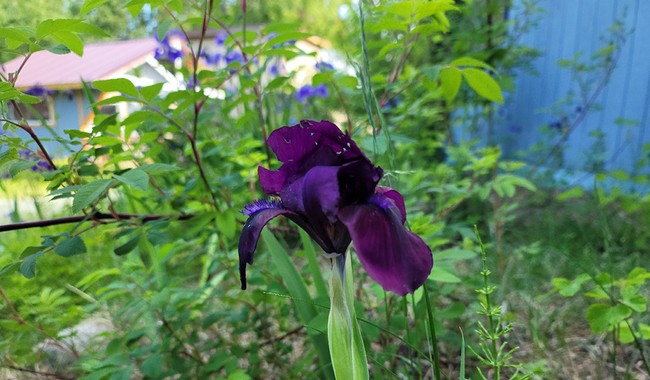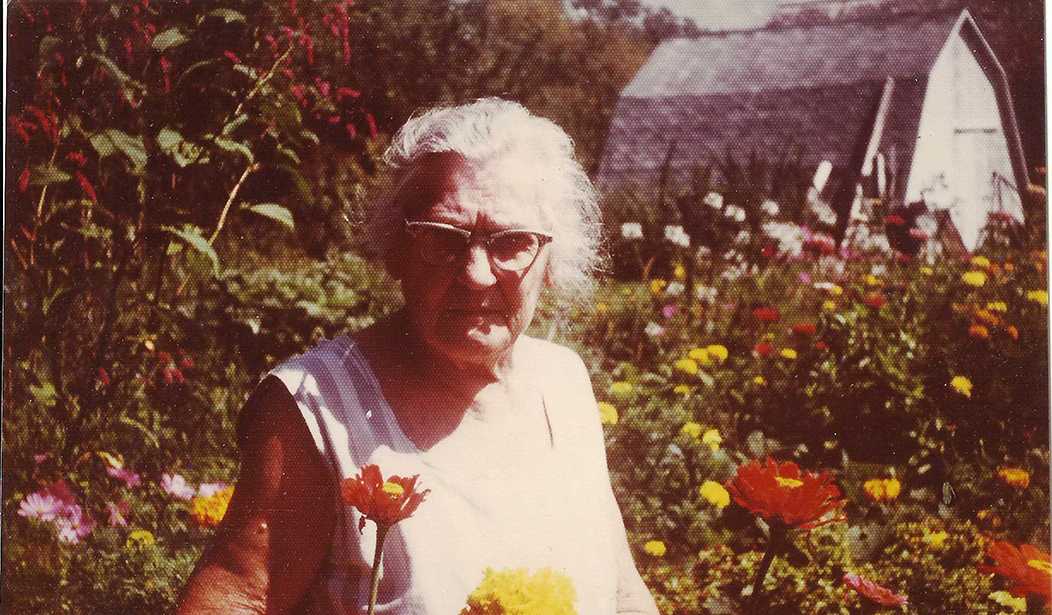My maternal grandmother took a lot of pride in her accomplishments throughout her 87 years of life. When I became a parent, she freely offered advice, reminding me that she had raised six children during the Depression; in fact, Grandma gave me the best parenting advice I've ever received when she said "Hug them, kiss them, and feed them, and they'll turn out fine." She was the only one of my grandparents born in the 20th century — in 1901 — and had lived an eventful life even if she never ventured more than a hundred miles from the tiny community in northern Lynn County, Iowa, that she called home. I remember her as a peppery old lady, tough and determined, decisive, and even at 4'10" and never more than a hundred pounds soaking-wet, nobody was ever capable of pushing her around.
Grandma left us in 1987, but a part of her legacy is still with me today, and I was reminded of that only yesterday.
My wife and I are in the habit, when the weather allows, of taking a stroll around our property at the end of our workday before supper. In summer, we always look over our flower garden, and yesterday, my wife, who was looking over her dandelion patch (she makes a great dandelion wine), heard me call out: "Grandma's iris is blooming!" Now, for the story behind that iris.

Grandma, being an Iowa farm wife during the Depression, maintained a large vegetable garden, growing everything from carrots and turnips to pumpkins. It was part of the Depression-era effort to keep all those kids fed; she gardened, Grandpa kept a couple of hogs and a bunch of laying hens, and if they were poor, they were well-fed. Then came the Second World War, and while their two sons were off in the service, one in Europe and one in the Pacific, Grandma did her patriotic part by keeping up the effort as a Victory Garden.
Then the war ended. The United States entered into an era of peace and prosperity. Grandpa was making a good living with his carpentry and his fields, as corn and soybean prices were good, and so Grandma, along about 1947, announced that henceforth she would only grow flowers in her big garden. "We will," she announced, "buy our vegetables in town." True to her word, for the rest of her life, she grew only flowers — although she kept right on harvesting berries and producing wonderful mulberry, raspberry, and dandelion wines.
Her irises were her particular pride and joy. She hand-picked each plant and moved them about, discarding ones that didn't meet her standards, and over a couple of decades, came up with a remarkable strain: big, durable, and in a variety of colors. She would give surplus bulbs away at times, but only to family, and only if she was satisfied they would be cared for.
Around 1975, my mother was starting what became her equally expansive flower garden in our Allamakee County homestead, and so Grandma gave Mom a few bulbs, which Mom put in a prominent place in her garden. They flourished and expanded, Mom cared for them as her mother had instructed, and in time, Mom followed Grandma's practice of carefully disseminating bulbs to those she thought would care for them.
See Related: Don't Trust Democrats With Your Grandma
Parenting and Grandparenting: Can You Overthink Them?
One of those people was my (then) brand-new wife. We had just returned from Desert Storm, bought a small house in Aurora, Colorado, and in 1991, we were married in Mom and Dad's yard, just outside the gate to Mom's flower garden. As a wedding present, Mom gave my wife a couple of iris bulbs.
We took them to Colorado, and they did well in the dry, sandy soil so that, in time, we had a good-sized patch of my grandmother's irises. Grandma didn't live to see her favorite flowers make this first inter-state jump, but we feel sure she would have been proud to see her irises growing and expanding.
And so it came to pass that my wife and I, after twenty years of planning, saving, and researching, bought our home in the Great Land and moved north. My wife, knowing the family history behind the irises, dug up several bulbs and brought them along. Transplanted irises often don't bloom for several years. Grandma's irises seemed to do well enough in the Great Land; my wife had looked into it and had reassured herself that Alaska's climate wasn't too harsh for the plants. But, for a few years, while they sent up healthy-looking leaves every year, Grandma's irises remained bloomless.
Until yesterday.
Now I have that lovely, deep purple bloom in our garden, a bloom that can trace its lineage from Alaska to Colorado, to northeastern Iowa, then to a small farm in east-central Iowa, over the course of eighty years. It is in a prominent place, right near our front door, and is surrounded by other flowers, including another strain of bearded iris, columbines, a tiny white flower my folks always called "Dutchman's breeches," ferns, and other local flowers. But the iris is for my wife and me, as it was for Mom, as it was for Grandma, our pride and joy. These things are important; they are touchstones to memory, and one day, we may well be giving some bulbs to our grandchildren so the tradition may continue.
For now, it's just the one bloom. The others are up and look healthy but remain flower-free. But while the others will bloom in time, this one is a start, and when I look at it, I feel certain Grandma would have been happy.
Grandma, I hope we've done you proud.













